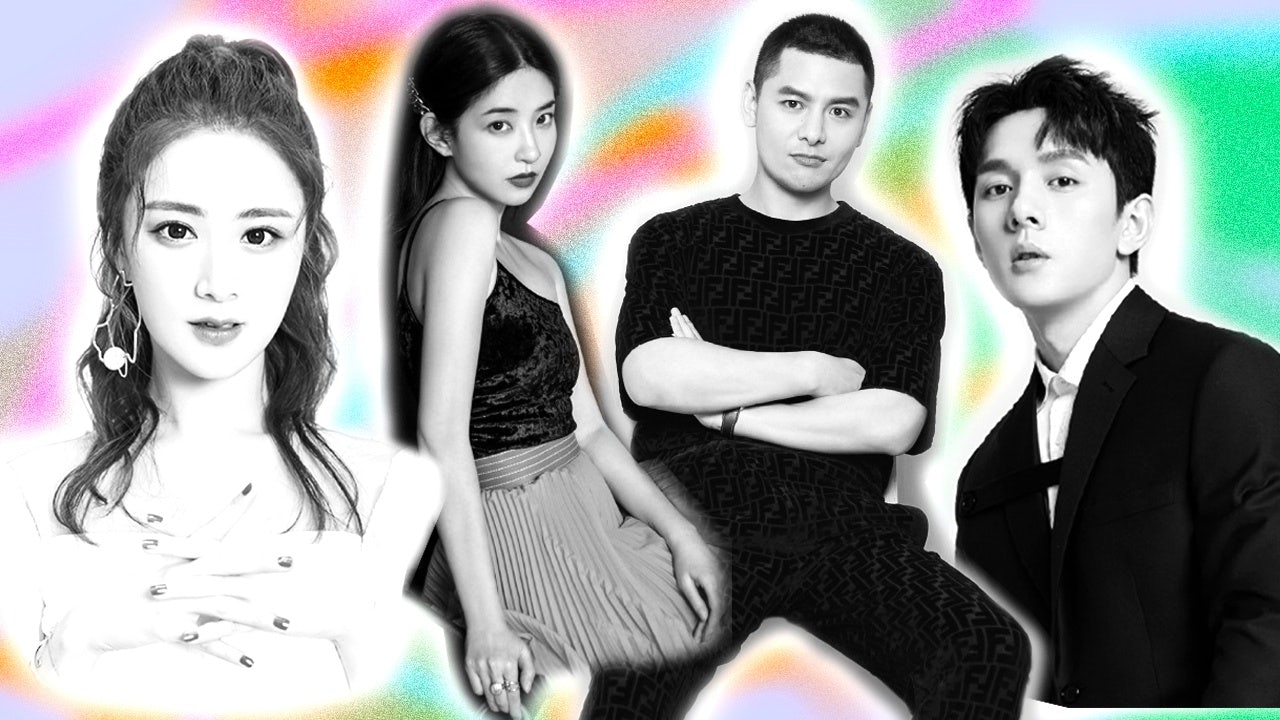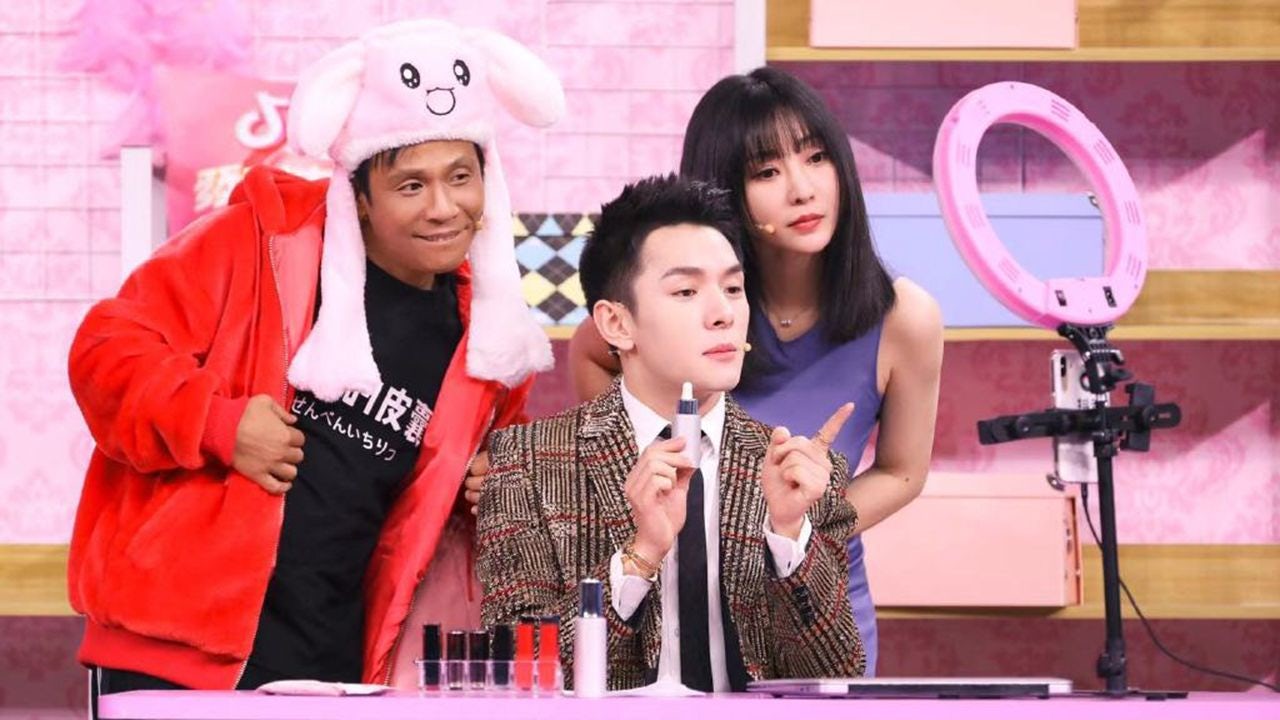Two months after announcing the unprecedented quarantine of millions of people, the Chinese authorities are trying to get the country back to work. But China’s facing a delicate balancing act between containing the virus and supporting a faltering economy. The outbreak has taken a heavy toll on retail by forcing the majority of Chinese residents to stay at home. According toBloomberg, store traffic in China is creeping back up after falling as much as 80 percent during COVID-19’s peak in China earlier this winter, which dried up sales for fashion brands like Burberry Group Plc and Kering SA's Gucci.
Consumers showed less interest in making significant luxury purchases during the lockdown, forcing luxury brands to come up with more effective Omnichannel campaigns while remaining sensitive to their consumers’ new reality. But now might be a great opportunity to push forward brand values, whether that means making a huge donation or just demonstrating a positive attitude.
While working as ambassadors for many brands in China, some of the country’s top Fashion KOIs (Key Opinion Influencers) have set a good example of how to make the most of the moment and cement relationships with fans. Some KOIs even got more followers during the quarantine period. Brands should study the way these Fashion KOIs interact with their followers as it’s a good way to get to know the Chinese market, and for their benefit, Jing Daily has categorized the main topics of Chinese Fashion KOI posts from the quarantine.
As one of today’s most popular KOIs, Viya and her team generated a great series of caring posts on WeChat while her livestream was on pause because of the outbreak. She has nearly 6.5 million followers on Taobao, who range from teenagers to 50-year-olds, and most are eager to buy.
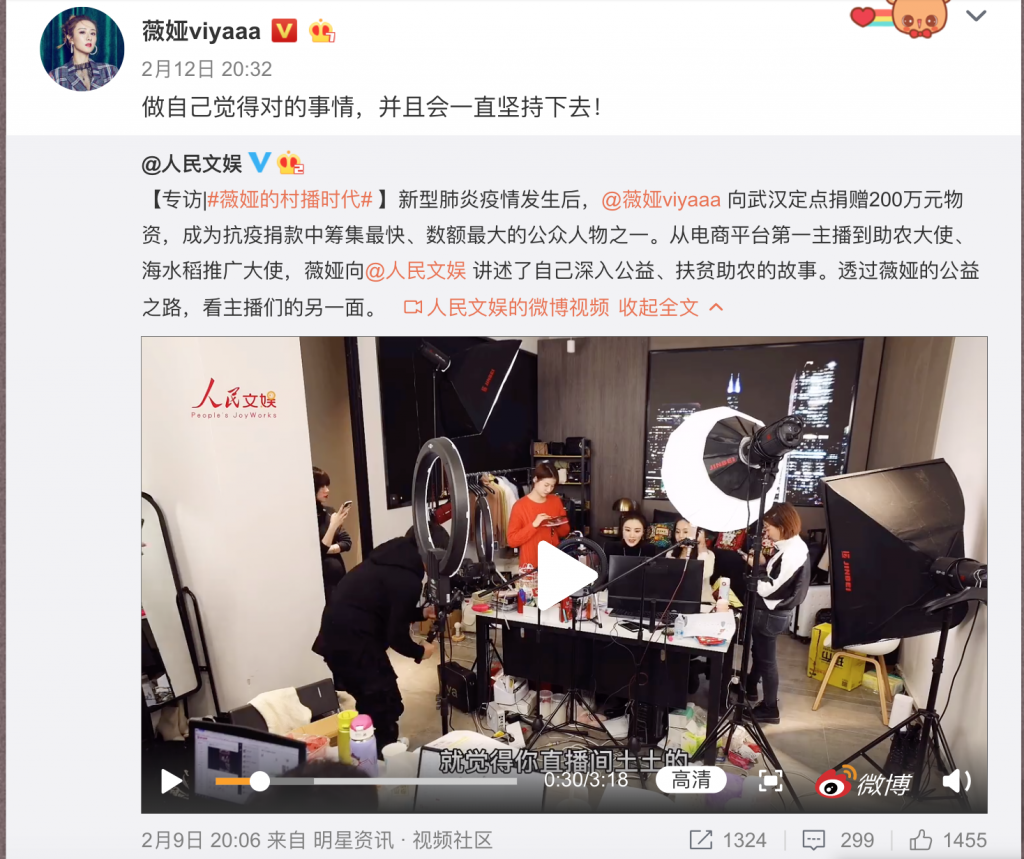
She holds a single-day selling record (66 million worth of products) and helped sell all of Kim Kardashian's 15,000 KKW fragrances in five minutes. On January 24, Viya announced that she was donating one million RMB (as well as one million RMB worth of medical supplies that included food, masks, and disinfectant) to the city of Wuhan. The fashion KOI added that she made the donation on behalf of her loyal followers, who she refers to as Viya's Women. She also launched a seven-day "virus precaution" WeChat campaign where she would post updates about the virus crisis, salute medical personnel, and organize livestreaming Qamp;A sessions to help answer questions about fans’ concerns.
Meanwhile, Viya’s male counterpart, Li Jiaqi, donated protective medical clothing and masks worth approximately 1 million RMB. He also organized a fundraiser during his livestream, where he raised over 70 million RMB from his followers. The hugely popular KOI once sold an incredible 15,000 lipsticks in five minutes, and now he goes head-to-head in sales contests with Alibaba’s founder Jack Ma.
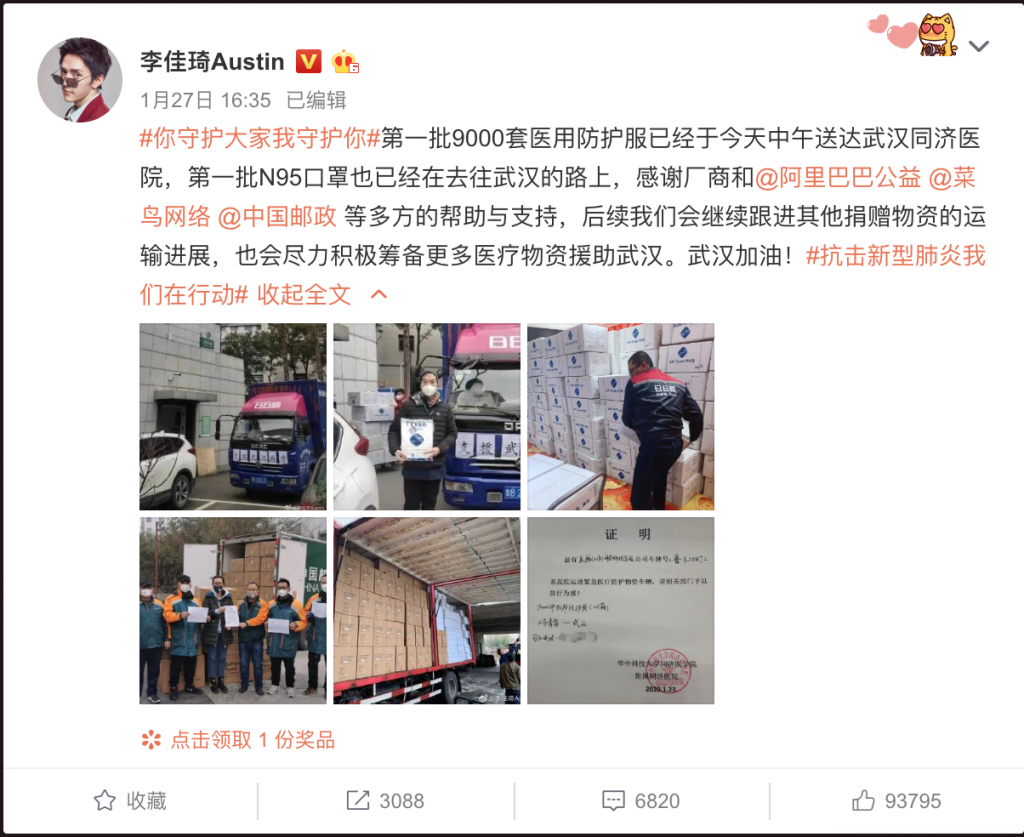
In less than three years, Li Jiaqi has gone from a monthly salary of 3,000 RMB to annual earnings of approximately 10 million RMB. Now the star spends most of his time researching his fans and learning about consumer psychology and sales techniques. Netizens trust him because he provides honest reviews and makes genuine recommendations. He has fans believing that he puts them first when selling.
Becky Li is a fashion blogger with over five million followers on Weibo. She is popular among women in their thirties who live in first-tier cities in China. She makes recommendations for their daily workwear, handbags, and accessories and donated one million to the Wuhan Charity Federation while also helping to gather much-needed medical supplies.
She also has shown concern for female medical personnel by teaming up with Tmall to have feminine products like tampons and hand cream delivered to workers in Wuhan. Caring for the women who are fighting the virus hardest sets a great example of how to build a strong, caring female influencer image. On her Wechat account, for example, she stated, "We got a comment from a nurse saying they are in need of shoes to wear with a protective suit, so we contacted the brands and worked on shipping them over."
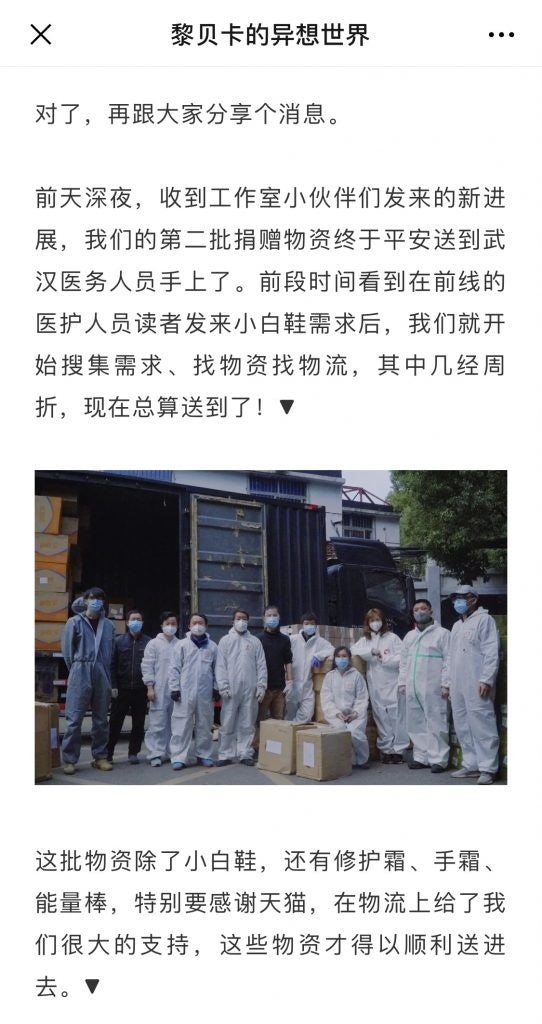
Other KOIs like Gogoboi and Mr. Bags have posted donation receipts on their accounts. As professionals who earn their money by promoting brands and products, this seems like an appropriate time to show gratitude and care for the people who have supported them.
Aside from donating to show concern, influencers have also crafted purposeful and caring messages for their fans on both WeChat and livestreaming platforms. Many have used their influence to help broadcast proper precautionary measures, like the correct way to wear masks and dispose of them or instructions on how to use other healthcare products and cleaning supplies.
KOIs were also valuable in helping to clear up false rumors circulating within social media circles, like that aspirin and pure alcohol could be used to fight the virus. They’ve also persuaded fans to stay away from crowds as a way of contributing during the crisis. This was especially true during the lunar new year holiday when it’s a tradition to prepare a huge feast and organize family gatherings. "Staying at home is the best support for this national health crisis, and we appreciate your cooperation," Mr. Bags wrote in a letter to his fans on WeChat.
A key strategy for influencer marketing is knowing your audience and what they want to read. While their fans stayed at home with time to spare, fashion KOIs came up with a list of things their fans could do without stepping outside. One common choice was suggesting entertainment like movies, books, online lectures, or even mobile games. Becky Li came up with lists like The 100 Best Movie Looks and The Best Fashion-Related Movies and Books.
The extended holiday also turned the Taiwanese love drama “Some Day or One Day” into a trending topic. One influencer (XiMenDaSao) analyzed all the accessories in the show along with links so readers could purchase them. Meanwhile, fashion influencer Shenyefashi organized a list of 32 different games for her fans to play on their phones. She even made a list of the best cartoons so her fans’ kids would have more to do.
How to stay healthy and strong soon became a priority for citizens in an outbreak, and many fans worried about putting on weight during the staycation. Because of this, many influencers came up with a series of well-designed workouts that didn't require equipment. These included core training, cardio, and fat-burning sessions. Some also gave diet recommendations to complement exercise programs. For bloggers, promoting health and beauty comes from within. As such, they offer the content they care about, whether it's health management, financing, or something else.
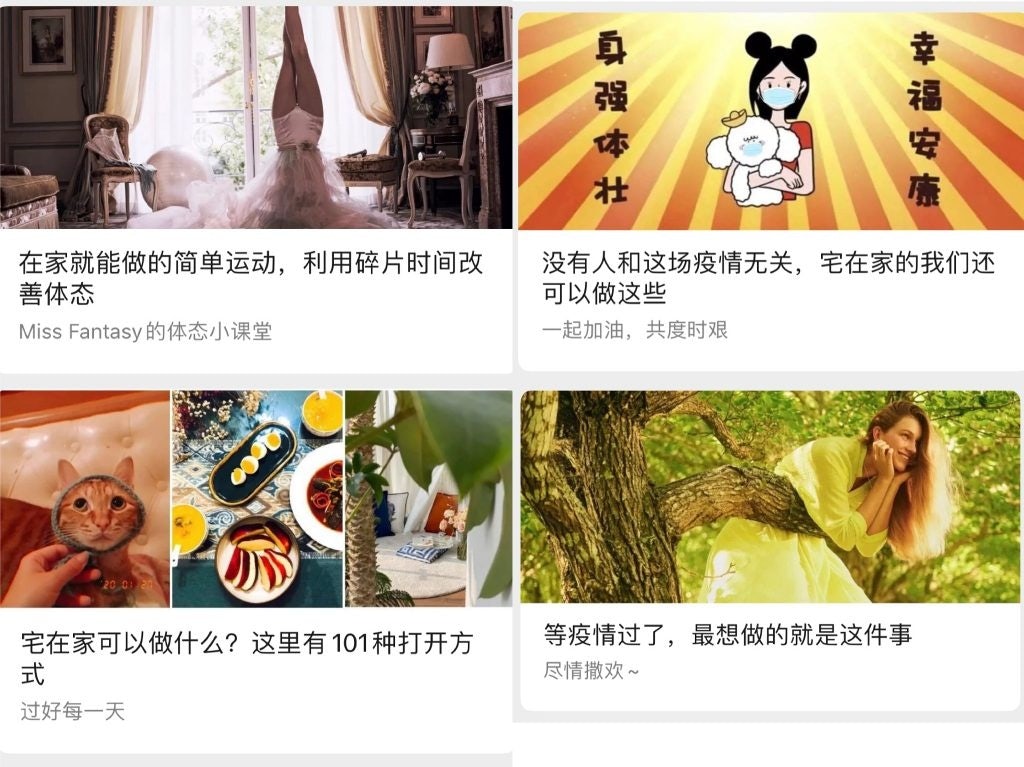
As they watched the urging coronavirus numbers from within quarantine, people desperately craved psychological comfort. Influencers' heart-to-heart conversations with their fans were helpful and also strengthened the bonds between them. "It is a difficult time, but we're in this together, and I'm with you," read the title of the letter from fashion KOI Mr. Bags to his followers. This has been the gist of most influencer messages to their audiences, and it comes from the perspective of people who are experiencing the crisis alongside everyone else.
Influencers are looking to build deeper emotional connections with their audiences. In Becky Li's letter to her fans on WeChat, she reflects on how life has changed since she started her blog. She talks about the importance of health, family, and work-life balance. And by mentioning the difficult times in her career, she relates to the anxiety and pressures her female readers feel, while also allowing them to see the human and vulnerable side of their favorite fashion icon.
In one of Viya's posts on WeChat, she collected 50 inspiring news stories as a change from just updating the disturbing news. She also attached the phone numbers or professional psychologists and added that followers were also welcome to reach out directly to her through WeChat and Weibo. Several other influencers collected comments and stories from their followers and shared them on their account as moral support.
It is a smart choice for fashion KOIs to be sensitive to their consumers during a crisis like this rather than just push out the same promotional messages. That is something brands could learn from. And as consumers in China wait patiently for a tipping point to arrive with the warm weather, they won't forget the people and companies that offered them help and support over the winter.
